- Home
- Trevor Scott
Fatal Network Page 11
Fatal Network Read online
Page 11
"Did you find out anything?" she asked.
"Yes. But I don't know what."
"What do you mean?"
"Well, I followed the commerce chief."
"Kirby Stanley...the third."
"Yeah. I followed him on the Metro from his house to a small store downtown. After about ten minutes, he came out carrying a briefcase similar to the one on the table there, only it was brown and a little bigger. The store sold mostly business computers and office supplies."
"So, you want to know why in the hell he went all the way downtown to buy a briefcase?"
"Exactly! I mean I'm not stupid enough to believe that he bought that briefcase. I think he picked up something from someone in the store."
"So, what do you think was in the briefcase, kid?"
Kurt got up from the couch, put his hands in his pockets, and paced over to the large window that overlooked a beautifully landscaped courtyard three stories down.
"Before you answer, I want you to know that I went across town for this leather skirt, so it is possible that a briefcase is just a briefcase."
Kurt paused. "I've got this strange feeling, Toni. There's more to this than just computer chips and avionics technology."
"I agree," Toni said. "But what do you think is going on?"
Kurt turned and looked straight into Toni's dark rounded eyes.
"I've been lying here thinking about it for a couple of hours, and I just have this hunch that something bigger is taking place. Do you ever get this feeling that something is going to happen, and then something does happen? And then you don't know if what you were just feeling was an anxiety of uncertainty, or an actual premonition. You have no way of knowing...may never know. That happens to me sometimes. It's happening to me now."
Toni clicked opened both locks on the attaché case simultaneously, and popped the case wide open.
"What do you have?" Kurt asked.
Toni looked at him with a fiendish smile that must have driven her parents crazy.
"I received a diplomatic pouch from our courier this morning," she said. "Some interesting stuff on the Commerce Department men and their mission."
Kurt moved back and sat on the edge of the sofa nearest Toni.
"It answers a few questions for us," Toni said. "For instance, why the U.S. Commerce Department even has an office in Italy. According to the orders given to Kirby Stanley and his men only a few months ago, they're supposed to have a two-part agenda. Aid U.S. companies currently operating in Europe, and help East European countries move toward market-based economies."
"You've lost me. What in the hell does this have to do with ripping off computer chips and selling them to the bad guys?"
"You know how you said you get strange feelings when something's about to happen? Well, I've got a feeling. I think these guys, or at least someone at Commerce, may have a hidden agenda."
"Wait a minute," Kurt said. "Did you say they were to aid U.S. companies currently doing business in Europe?"
"Yes!"
Kurt thought for a moment. "You mentioned it to me a few days ago. The economic unification of Europe. You said those U.S. companies who don't get a foot in the door soon could be out in the cold and lose whatever European market share they have."
"That's right! And the abstract of this Commerce Department statement of intent explains it further." She looked at some papers. "Congressional limitations on the transfer of high technology to NATO or other European countries will be adhered to without exception. So, someone has found a way to bypass the limitations."
Toni threw the report back into the attaché case. Rising from the chair, she began swearing and yelling in Italian. Kurt could understand most of it, but some of the expressions were clearly slang that he had failed to come across. He could tell that she had no use for bureaucrats. It reminded him of the time she interrogated Lt. Budd.
Finally, Toni composed herself enough to open a large bottle of Chianti, pour a glass, and take a long sip before sitting down again.
"That was interesting," Kurt said smiling. "Feel better?"
She didn't answer. Instead she took another sip of wine.
Kurt didn't want to push his luck, so he picked up the report on the Commerce Department and began reading it.
"All right, I'll tell you what the report says, kid."
Kurt quickly dropped the report.
"Stanley, the main man, is basically a yes man," she said. "He used to work for the International Trade Commission until about a year ago. The analyst who wrote this report for us said that Stanley is the brother-in-law of some big whig in the State Department. That guy supposedly got Stanley promoted to this post. Until his recent assignment to Italy, he was an Export Enforcement Policy Analyst in Washington."
"Sounds impressive."
"Not really. Commerce has a bunch of them. Anyway, the second in charge of the Rome bureau is a guy named Jason Dalton. He hasn't been around for a few days, so we haven't tailed him yet. Dalton is an International Trade Analyst. He was working at the National Institute of Standards and Technology in Gaithersburg, Maryland, prior to his assignment here. He's only been with Commerce for about a year, also. Before that, he worked in the private sector with a number of different companies."
"What kind of companies?" Kurt asked.
"Manufacturing, computers, small business consulting firms...you name it, this guy has been around."
"Computers! So this guy could know a good chip if he saw one," Kurt said.
"The other three who work out of the office are mostly administrative types. One is a receptionist slash linguist."
"Is that the good looking blonde," Kurt asked. "I'd like to see the slash part."
"Easy sailor. She helps with the wining and dining. As far as I can tell, she's the only one who speaks Italian. The other two? One's an administrative assistant. Sterling, boring background. The last guy is the one I've been checking out the last couple of days. He's a bookworm-type researcher. Spends all day scanning company statistics."
Kurt got up and went to the small table with the bottle of wine and three glasses. He was about to pour himself a glass, when he realized he still couldn't force himself to drink wine before lunch.
"We need to concentrate on Stanley and Dalton," Toni said. "Why don't you stick with Stanley?"
"Wait a minute," Kurt said. "This is Navy technology leaking out. I think I should go after Dalton, since he's the technology expert. Besides, you said yourself that Stanley is a yes man. Maybe you can convince him to talk like you did with Lt. Budd," Kurt added.
Toni glared at Kurt. "Okay, kid. Dalton is yours. But be careful. He's been gone for at least a few days, so he could have been involved with the bombing of those sailors in Genoa."
That was another reason Kurt wanted Dalton. If the sailors were selling out their country, then they deserved what they got. But if someone made them an offer for money they'd never see in a lifetime as a sailor, then they weren't all that was wrong with the equation. They were still sailors after all. Shipmates stuck together. A sentence at Leavenworth would have been far more painful than a quick blast from a bomb.
Kurt and Toni ate a scant lunch, worked out assignments and their next meeting, and then departed to observe Stanley and Dalton.
* * *
CHAPTER 20
URMITZ, GERMANY
The green and white Polizei car slowly cornered back and forth down the switched-back hills of the West bank of the Rhine river. A morning iridescent glow filled the sky above a light fog that rose from the warmer river. The car turned left at the bottom of the hill and drove two kilometers along the curved edge of the Rhine where volcanic rock cliffs of the Neuwied Basin narrowed the road at numerous junctures. Two other Polizei cars and a medical van waited alongside the road.
Walter Kaiser slowly opened the front passenger door and lingered for a moment to observe the scene. He'd seen a number of dead bodies throughout his Polizei career. Mostly young men with too much beer and
a heavy right foot destined to test the laws of physics with their Volkswagen laboratories. But this was the first time that he would have to determine the cause and reason of death and who was responsible.
"Inspector Kaiser?" asked an officer in uniform who approached from the river's edge.
Walt closed the car door and greeted the officer, "Ja."
"Sir, the body has been pulled from the river, but we don't want to move it any farther," the officer said.
Walt followed the officer to the edge of the river at a reluctant pace. He hadn't been told of the condition of the victim, but was fairly certain it wouldn't be a pretty sight.
A green plaid wool blanket lay haphazardly over the body in short grass on the bank of the river.
"How was the body found?" Inspector Kaiser asked, looking out to the river.
"A passing bicyclist on his way to work noticed it hung up in some overhanging branches," said one of the officers. "It couldn't have been there too long."
Kaiser turned and looked at the officer. "Why is that officer...Jung?" he asked reading his name tag.
"Well, the rain-swollen river reached its highest crest almost a week ago, and it receded nearly a meter in just a few days," he said apprehensively.
"So the tree is normally out of the water, and now the river is down to about normal levels," Kaiser added. "Therefore, the body must have gotten hung up in the branches less than a week ago. But, that only tells us when the body got here. How long has it been floating down the Rhine? And, where did it come from?"
Another officer stepped forward and uncovered the body. "The victim is still well preserved, so it couldn't have been in the river long."
Walt finally made himself look at the body lying at his feet. There was a bag over the victim's face, and some sort of vest strapped around his mid section. Well preserved may have been a hasty observation. Looks can be deceiving, but the smell of rotting human flesh is ingrained forever upon the nostrils of those who have had the displeasure of taking in a whiff. Walt was relieved at what he saw, but still puzzled.
"What in the hell is that?" Walt asked, pointing downward to the body's head.
"We don't know," said the first officer. "We didn't want to change anything until you got here."
Thanks guys, Walt thought. Now he'd have to open this bag and watch the brains of some poor slug ooze out. But what in the hell was that thing around his waist?
"I guess we can rule out suicide," Walt said as he tugged on a rope that had bound the body hand to feet as swine often were just before being butchered.
The men just looked at Walt not knowing if he was serious. Then Walt let out a slight chortle. "It's fine to make light of a situation, sometimes. Without a bit of humor we'd all go insane, and end up committing horrid crimes like this."
The two officers finally allowed a smile.
Walt looked up at the medical technicians and the other two Polizei who had remained at the roadside with his driver. The Polizei were in their late forties and didn't appear overly concerned with the body. The two Polizei with him at the body were in their mid-twenties and apparently eager to learn, or at least find out the truth.
"What's with those two?" Walt asked, nodding his head toward the older Polizei.
Officer Jung looked over to his partner and then back to Walter. "I hear they've been partners for the last twenty years. They do everything together. In fact, they live together. Some say they'd get married if the law allowed."
Walt looked up to the road again, then back at the young officers, and shook his head. "Oh well. More women for me," he said with a smile.
The young officers let themselves laugh.
"Did you check for identification?" Walt asked, getting back to the body.
Without further prompting, Officer Jung reached down to the body with gloved hands and carefully began to search for any sign of identification. The victim had twelve Deutschemarks in change in his left front pocket, and a set of keys in his right front pocket.
"So, he was right handed," Walt said.
Officer Jung gently placed the keys into a plastic bag held open by his partner who then relayed them to Inspector Kaiser.
Walt looked over the keys. One key had a Chevrolet symbol. When Walt saw that, he knew this case would be more complex than at first glance.
"Shit!" Walt said.
"What's wrong, sir?" Officer Jung asked.
"He's American."
"How do you know?"
"Well, not many Germans drive Chevrolets," Walt said.
Walt pulled a small Swiss Army Knife from his pocket, bent over next to the body, and cut the elastic tie that held the bag cinched around the man's neck. Walt pulled his hand back as if expecting something to jump out at him. Nothing happened. With a small stick, he opened the mouth of the plastic bag and slid it off the victim's head.
"Camera, please," Walt said to the officers.
Officer Jung quickly ran to his green and white Opel and returned with a camera and flash unit.
To Walt's surprise, there was very little blood visible. The man's face was pale and colorless. His eyes were closed, but the lines around the outsides of them indicated his age must have been in the forties. Why the bag? Walt turned the man's head sideways and noticed dried blood inside his ear and streaks of blood coming from somewhere on the back of his head.
Officer Jung clicked off a few close up shots of the man's face.
"Let's roll him over carefully," Walt said.
The two young Polizei did as he said, rolling the man on his side and exposing the back of his head. From that view it was pretty obvious why the bag must have been used. The man's skull was split wide open. The rest of the blood must have seeped out through the bottom of the bag, Walt thought.
"What do you think?" Walt asked, looking at Officer Jung.
The young officer looked shocked to be asked his opinion by an inspector from the regional office in Koblenz. He hesitated for a moment to be sure that he said what he meant without sounding obtrusive. "I think someone crushed his head with a metal pipe or something, and then put the bag over to keep the blood from getting all over the place."
"Good! But wouldn't the blow have knocked some blood out almost instantaneously?" Walt asked. "Maybe whoever hit this guy wasn't supposed to hit him so hard. And the bag was originally intended to make sure the guy couldn't breath if he happened to wake up from the blow after hitting the water. Of course, the killer or killers had this planned out in advance. So we're talking a professional hit here."
While Walt was talking to the officers, he pulled one of the velcro strips that held a sand weight to the victim's chest, and flopped the sides of the pouch to the ground at the man's sides.
"Now we know how the man died," Walt revealed. "What we don't know is where and when he died, who killed him, and why."
Walt remembered from his training that sometimes the most obvious details were those overlooked. The search for the complex was not always appropriate. But what about the weights? Not enough to make the man sink to the bottom, but enough to keep him below the surface. Maybe the killers wanted to make sure the guy got far enough away from the murder site, yet wanted him to be found eventually.
"I found something," said Jung's partner. He slid his hand from the inside pocket of the Rhine-soaked man, and retrieved a brown leather wallet. With rubber gloves, he quickly handed it to Inspector Kaiser.
Walt carefully opened the wallet. All the contents were streaked and stained from the brown leather die. A hundred and fifty Deutschemarks in bills, a muddled photograph of a woman and two young children in 1970s clothes, and a Visa and Mastercard. Finally, a name for this guy, Walt thought. And then, a retired U.S. military ID card.
"Charles M. Johnson," Walt said. "U.S. Air Force retired. How did you get yourself into this predicament, Mr. Johnson?"
Walt continued to search the contents of the wallet. From one of the side pouches, he pulled out a business card with Charlie Johnson's name on it. I
n bold green Roman letters it read: Teredata International Semiconductors.
Immediately Walt took a double take of the card. He remembered his conversation with Jake Adams less than a week ago. Jake was working for the president of TIS trying to find out who was buying up some of their computer technology. How Gunter Schecht and his men tried to blow him away. The man Jake was looking for.
Walt instructed the men to continue with the photographs, and to ship Johnson back to Koblenz for an autopsy. "Bag everything," he said.
He went back up to his car and sat in the front passenger's seat wondering what his friend Jake was up to. But Walt had no idea where his old friend was staying. Finding Jake would have to be his first chore in solving this murder.
* * *
CHAPTER 21
BONN, GERMANY
Jake got back to his house on the right bank of the Rhine after first eating breakfast at the old Bad Honnef castle. His head was still not clear after the night of beer and conversation with Herb. The sun had finally made a long awaited appearance. Jake checked over the house. Nothing looked out of the ordinary.
All of his communications equipment lay meticulously on a wooden desk in his bedroom as if it had been accumulating there for years. Time to call Milt, Jake thought.
Since it was the middle of the night in Portland, Jake realized he should call Milt at home.
The tired voice of a woman answered, "Hello."
"Sorry to disturb you, but may I speak with your husband?" Jake asked apologetically.
He could hear Milton Swenson asking his wife who it was on the phone. "I don't know!" was the terse reply.
Milt picked up the phone after apparently moving into another room and having his wife set her phone back down.
"Hello," Milt said groggily.
"It's Jake. Sorry to bother you so late."
"Shit!" Milt said. "Jake, where in the hell have you been?"
"Hey, Milt, I'm sorry I haven't kept you informed, but things have been really crazy around here."

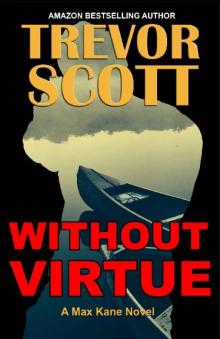 Without Virtue
Without Virtue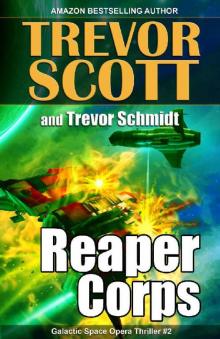 Reaper Corps
Reaper Corps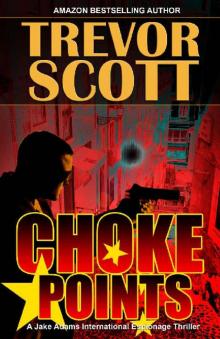 Choke Points
Choke Points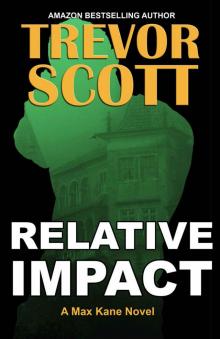 Relative Impact
Relative Impact![[Jake Adams 01.0] Fatal Network Read online](http://i1.bookreadfree.com/i/03/20/jake_adams_01_0_fatal_network_preview.jpg) [Jake Adams 01.0] Fatal Network
[Jake Adams 01.0] Fatal Network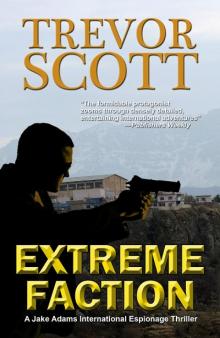 Extreme Faction
Extreme Faction The Hobgoblin of the Redwoods
The Hobgoblin of the Redwoods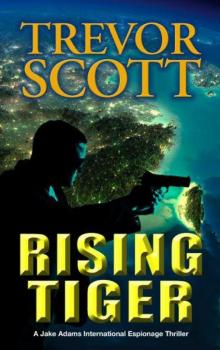 Rising Tiger
Rising Tiger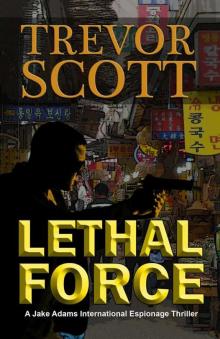 Lethal Force
Lethal Force Quantum Trigger
Quantum Trigger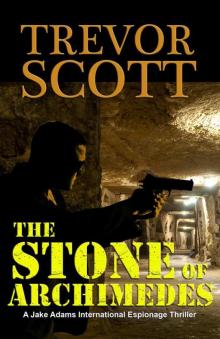 The Stone of Archimedes
The Stone of Archimedes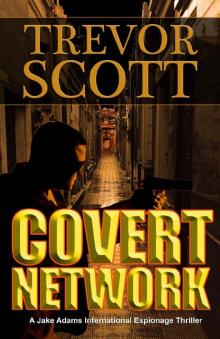 Covert Network (A Jake Adams International Espionage Thriller Series Book 14)
Covert Network (A Jake Adams International Espionage Thriller Series Book 14) Caruso 01 - Boom Town
Caruso 01 - Boom Town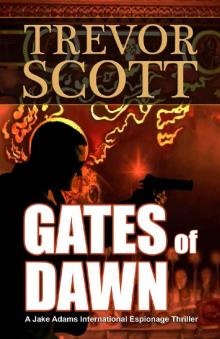 Gates of Dawn (A Jake Adams International Espionage Thriller Series Book 12)
Gates of Dawn (A Jake Adams International Espionage Thriller Series Book 12)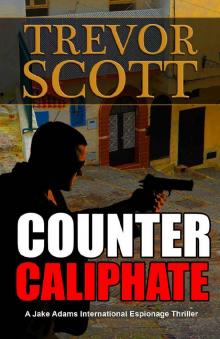 Counter Caliphate (A Jake Adams International Espionage Thriller Series Book 11)
Counter Caliphate (A Jake Adams International Espionage Thriller Series Book 11)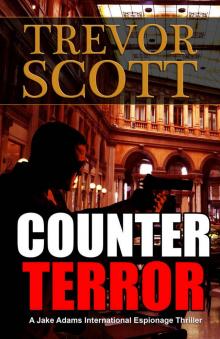 Counter Terror (A Jake Adams International Espionage Thriller Series Book 13)
Counter Terror (A Jake Adams International Espionage Thriller Series Book 13)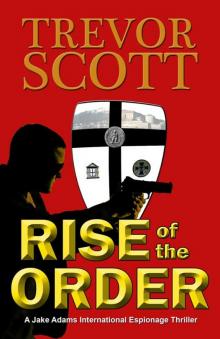 Rise of the Order
Rise of the Order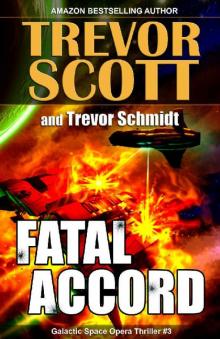 Fatal Accord
Fatal Accord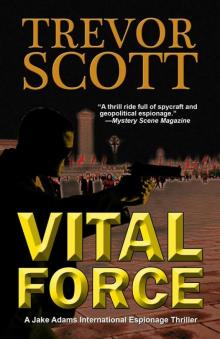 Vital Force
Vital Force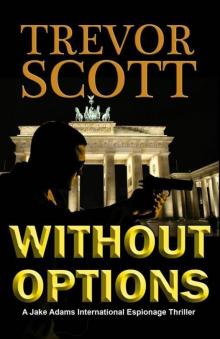 Without Options
Without Options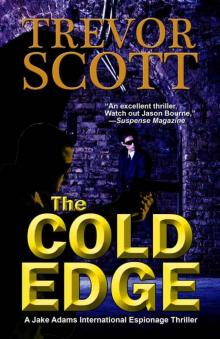 The Cold Edge
The Cold Edge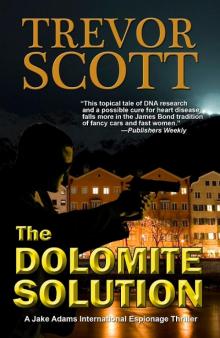 The Dolomite Solution
The Dolomite Solution Cantina Valley (A Ben Adler Mystery Book 1)
Cantina Valley (A Ben Adler Mystery Book 1) Fatal Network
Fatal Network